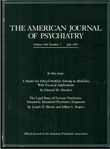DSM-III as a research tool
Abstract
The author describes the use of the DSM-III's diagnostic criteria and classification system as a research instrument and discusses some of the advantages and drawbacks of DMS-III for a specific type of study. A rearrangement of the hierarchical order of the DSM-III diagnostic classes is suggested. This rearrangement provides for levels of certainty in analyzing interrater reliability and offers a simplified framework for summarizing group data. When this approach is combined with a structured interview and response format, it provides a flexible way of managing a large classification system for a smaller study without sacrificing standardization.
Access content
To read the fulltext, please use one of the options below to sign in or purchase access.- Personal login
- Institutional Login
- Sign in via OpenAthens
- Register for access
-
Please login/register if you wish to pair your device and check access availability.
Not a subscriber?
PsychiatryOnline subscription options offer access to the DSM-5 library, books, journals, CME, and patient resources. This all-in-one virtual library provides psychiatrists and mental health professionals with key resources for diagnosis, treatment, research, and professional development.
Need more help? PsychiatryOnline Customer Service may be reached by emailing [email protected] or by calling 800-368-5777 (in the U.S.) or 703-907-7322 (outside the U.S.).



